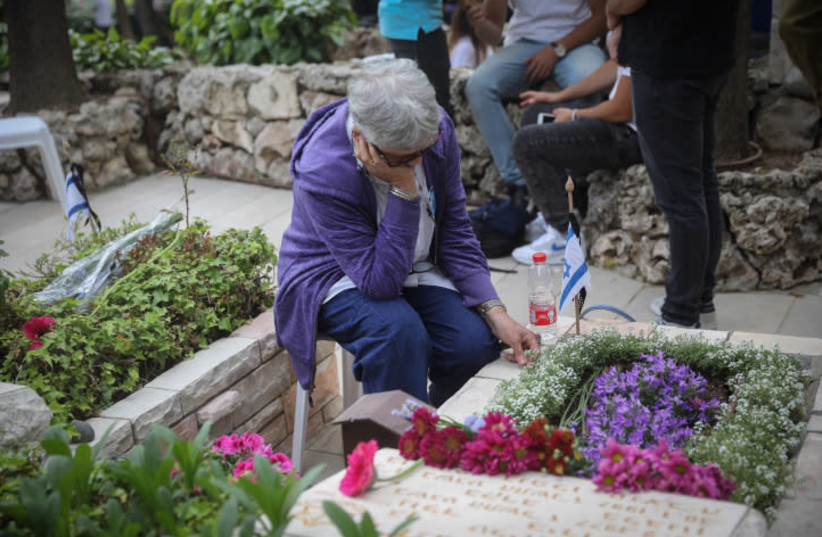Mashka Litvak had to go to the cemetery as a child if she wanted to speak with her father, Moshe, who was killed before she was born, in a small gun battle during Israel’s War of Independence.
“I was born into bereavement,” recalled Mashka, explaining that she was not the only war orphan on Kibbutz Negba where she grew up with her older brother, Arnon, who was killed during his reserve army duty in 1970.
She spoke at the 17th annual Israeli-Palestinian Joint Memorial Day Ceremony, in which both Israelis and Palestinians recalled the losses they have suffered as a result of the conflict between both peoples.
This year the event was held simultaneously in Tel Aviv and in Beit Jala in the West Bank, and was broadcast virtually with a split-screen from both venues.
Mashka recalled how growing up she was jealous that her brother had known her father while she could not even utter the word father until she was in high school.

In first grade, Arnon suggested she write a letter to her father.
“We both went to the cemetery, and I put the letter under the pillow of his grave. A few weeks later I returned, and the letter was not there. For years I believed my father had read it,” Mashka said.
Arnon’s death “shattered me to pieces. The loss was unbearable,” Mashka recalled. “I dived into a deep black abyss. I did not seek revenge, but neither did I find rest.”
She found solace in the peace movement so that she could work to ensure others did not suffer the same losses she had.
In 1995, Mashka recalled, she joined the Israeli-Palestinian Parents Circle-Family Forum (PCFF), which drew together bereaved families from both sides of the conflict.
“It is clear to me that there is no difference between the pain of a Palestinian mother and the pain of an Israeli mother. I know that the feeling of orphanhood and loss that bereavement brings is felt in the same terrible way by every nation on the face of the planet,” Mashka said.
“Just as we work together, so too must the leaders of the two peoples sit together around one table and reach an agreement that will stop the violence,” she added.
Ismael Khatib of Jenin, whose 12-year-old son was killed by the IDF in 2005, and who made international headlines when he donated his son’s organs to six Jewish and Arab Israeli children, also spoke. A 2008 documentary, The Heart of Jenin, further explored the family’s story.
On Tuesday night, Khatib recalled how 17-years ago his son “Ahmed went out to play with friends in front of the house.... An Israeli soldier shot a bullet at Ahmed’s head. The bullet hit him and fatefully wounded him,” Khatib recalled.
Khatib took his son to Rambam Medical Center in Haifa, but Ahmed could not be saved.
“The smile was erased from his face,” Khatib said. “How did it happen? Why? It’s hard for me to believe everything changed within a few seconds. My love, not only was your face extinguished but my, your mother and your brother’s souls were also extinguished.
“Our lives didn’t go back to what they were. Sometimes I feel the language lacks the words to describe the pain and the grief.”
When asked by a doctor if the family would agree to donate Ahmed’s organs, “My heart started beating fast. After all, I am standing by my late son’s bed and at the same time looking in the next room and seeing children fighting death.”
In that moment, Khatib said, he was flooded by a tsunami of emotions as he felt both his own grief and the pain of the families of the critically ill children.
“It was one of the most difficult decisions I’ve ever had to make. My humanity drove me to agree,” Khatib said.
Every time he saw the children laughing and running, he felt as if his son was still alive, he explained.
“My message to you and to the whole world today is to stop the bloodshed of the innocent. Stop the tears of the bereaved families. We should all enjoy freedom, justice and equality. Let’s all pray for peace,” Khatib said.
The event, which was jointly sponsored by the NGOs PCFF and Combatants for Peace, drew 200,000 virtual participants.
A number of right-wing politicians criticized the event and took exception to the attendance of left-wing parliamentarians and of well-known Israeli actress Rivka Michaeli in the ceremony.
Coalition members who came to the ceremony in Tel Aviv were Labor MK Ibtisam Mara’ana-Menuhin and Meretz MKs Mossi Raz, Gaby Lasky and Michal Rozin. Joint List MK Ofir Cassif from the opposition also attended the ceremony.
In advance of the ceremony, Likud MK May Golan said that the attendance of coalition parliamentarians in this ceremony “precisely shows the real face of this dangerous and anti-Zionist government, one that with God’s help will soon pass from this world.”
“This is not an ‘alternative memorial ceremony’ but another attempt by the Left to use this ceremony to create absurd symmetry,” she said.
“It is in fact a disgusting ceremony that praises terrorists and gives them equivalence to the sanctified murdered in the acts of terror and hostility and with the heroic IDF fighters who fell defending this country with their bodies.”
